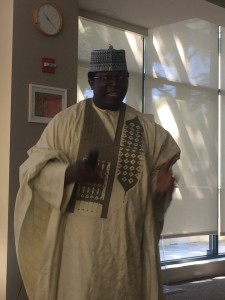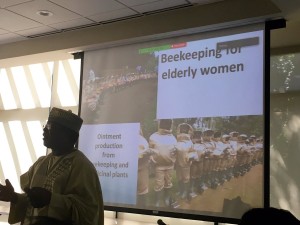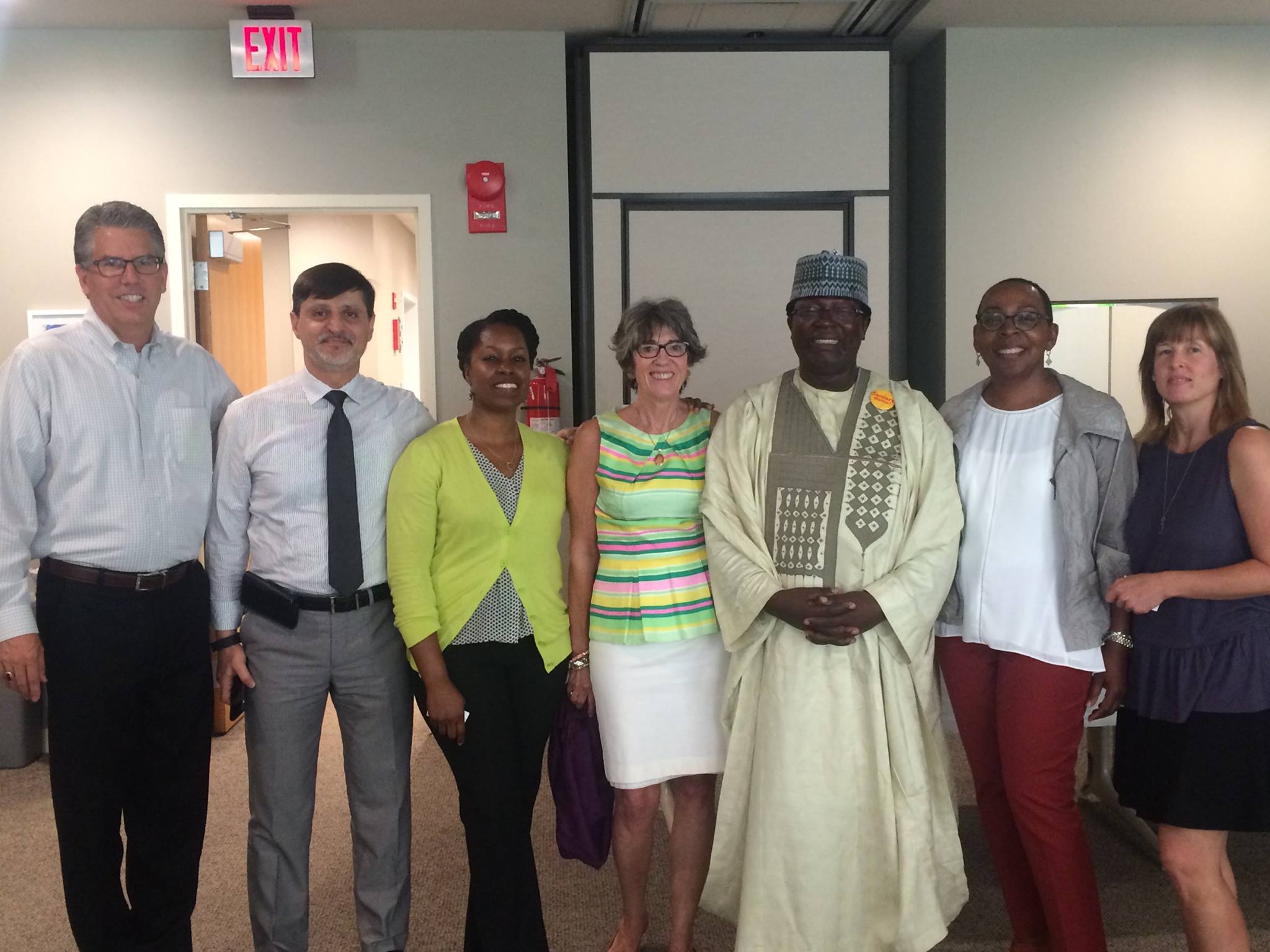By Mia Mullen, IAHSA
Francis Njuakom, Chief Executive of Community Development Volunteers for Technical Assistance (CDVTA Cameroon) and Jack York, Founder of It’s Never Too Late met at the 2015 IAHSA-ACSA Global Ageing Conference in Perth, Australia. Yet to see them together today is like watching two brothers with a lifetime of history.
After hearing Francis’s story in Perth, Jack wrote him a check for $500 in hopes of making a small difference. Only a few months later, he received message from Francis with some surprising news. His $500 donation was used to launch a sustainable goat rearing initiative for elderly women in Cameroon. CDVTA volunteers purchased 9 goats and distributed them to the poorest elder-led households in the community. The goats would serve as a sustainable source of income for these women and their families.
Since that time, there have been more goats and the project has grown into the G.O.A.T.T. (Giving Older Adults Tools to Thrive) Project. You can read about it here.
 Earlier this month, Francis traveled to the United States and, with Jack as his guide, traveled cross-country to share the story of their friendship and to provide U.S. constituents with a first hand account of what it is like to age in Cameroon. On the 11th of August, the duo stopped by the IAHSA/LeadingAge Office in Washington D.C. where Francis shared with us his personal story, the work of his organization and how it has impacted ageing in Cameroon.
Earlier this month, Francis traveled to the United States and, with Jack as his guide, traveled cross-country to share the story of their friendship and to provide U.S. constituents with a first hand account of what it is like to age in Cameroon. On the 11th of August, the duo stopped by the IAHSA/LeadingAge Office in Washington D.C. where Francis shared with us his personal story, the work of his organization and how it has impacted ageing in Cameroon.
The traditional experience of Cameroonian elders (particularly women) is often one of poverty with limited access to care, support and services. Cultural practices have contributed greatly towards these circumstances. In his homeland of Kom, Francis shared that women are not able to inherit the property of their husbands, nor are they allowed to work or generate income, making it impossible to care for themselves later in life without the help of their husbands.
In a world where women live longer than men, the typical narrative of an older person in Cameroon is that of a widow, living in poverty, with no line of income nor means to support herself or her family. To add, the AIDS/HIV epidemic in Africa has caused many women elders to become primary caregivers for grandchildren who have lost parents to the illness. Others have have assumed guardianship of their grandchildren so that their adult children could pursue a better life and job in the city. As with many countries in Africa, institutions of care are novel in Cameroon. Families still assume the role and responsiblity of caregivers. The long-term effect of these circumstances is a sustained cycle of poverty and isolation among these women and their dependents.
To address these issues, Francis founded CDVTA. The organization’s mission is “to promote elderly friendly communities through rights, advocacy and improved livelihoods”. The efforts of CDVTA over the past 20 years have resulted in a significant shift in Cameroon’s treatment and consideration of older people. The organization empowers elders and their families through activities that promote social inclusion, education, the development of sustainable livelihoods and volunteerism. The organization also advocates for the rights and welfare of elders on a national level, facilitating regular conventions and ongoing communications with government officials and other members of the community to ensure that the needs of the aged are met. The work of CDVTA has led to the successful enactment of a national policy on ageing.
From Francis’s talk, we noted three distinct themes of engagement that have contributed towards the longevity and success of CDVTA and its work in the community.
 I. Engage and Empower
I. Engage and Empower
Francis met with women elders in his community–and began to organize small clubs where the elders were able to meet and talk about the challenges they were facing in their communities, to prioritize their needs, and to develop possible solutions. This coming together reinforces that the issues and challenges faced by elders belong to the entire community.
The programs initiated through CDVTA help elders and their families to establish a sustainable livelihood. Family members are trained and certified in skills like beekeeping and are able to work at CDVTA’s sites to generate an income to support their households.
II. Raise Awareness Among ALL Stakeholders
CDVTA and the elders organized regional conventions, where stakeholders from all aspects of the community would come together to better understand the experience and needs of elders. The idea was to develop a sense of empathy among the community and to begin to collaboratively build and implement policies that better support and promote the care and rights of older people. Francis noted that international efforts around ageing also contributed towards Cameroon’s shift in focus around elder rights–including the 2012 United Nations decree on ageing.
III. Let Elders Lead and Remain Involved
Francis and CDVTA positioned themselves as a community partner and resource to elders. The elders meet regularly to voice and discuss concerns, serving as leaders and senior advisors to the community. These meetings or “clubs” have become quite popular over time, and it is not uncommon for people of all ages in the community to ask for membership.
The volunteer members of CDVTA are vetted and recruited by the elders themselves. To be recruited is perceived as an honor and has become a statement of trust and high esteem among the elders. The volunteers who provide care and aid are also beneficiaries in that their time with the elders gives them access to the rich history of their ancestry, the highly valued wisdom of the old and to learn traditional skills like basketweaving.
Francis shared that the only way to develop a sustainable long-term solution is to have its beneficiaries be involved in its development and operation.
Although much progress has been made, Francis stresses the importance of continued advocacy for rights and care of older people, and not just in Cameroon. From his travels, Francis observed that the experience of elders in developing regions of the world contrasts greatly to countries with more financial resources and advanced healthcare systems. He points out that poverty and limited access to care still create great challenges for the older people in his country. It is his mission to share his story with the world in hopes that more attention can be raised about those in lesser developed regions of the world whose care needs may be vastly different.
To learn more about the work and achievements of CDVTA Cameroon, click here.
To learn more about Francis’s journey in the U.S. (and to see photos), click Here.
You need to login in order to like this post: click here

